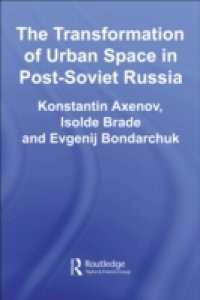In the years since 1989, the societies of Russia and Eastern Europe have undergone a remarkable transformation from socialism to democracy and free market capitalism. Making an important contribution to the theoretical literature of urbanism and post-communist transition, this significant book considers the change in the spatial structure of post-Soviet urban spaces since the period of transition began. It argues that the era of transformation can be considered as largely complete, and that this has given way to a new stage of development as part of the global urban and economic system: post-transformation. The authors examine the modern trends in the urban development of western and post-socialist countries, and explore the theories of the transformation and post-transformation of urban space. Providing a wealth of detailed qualitative research on the Russian city of St. Petersburg, the study examines the changing structure of its retail trade and services sector. Overall, this book is an important step forward in the study of the spatial dynamics of urban transformation in the former communist world.

